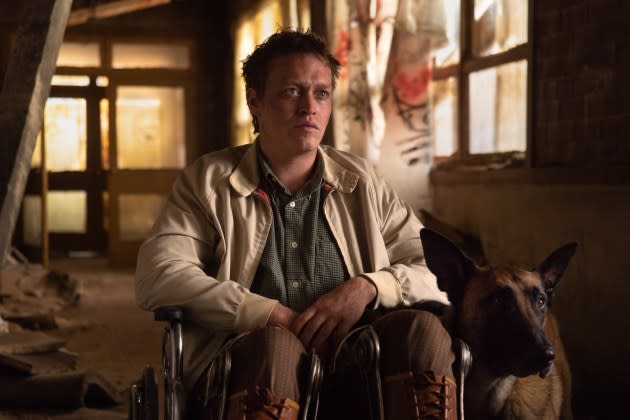‘DogMan’s Caleb Landry Jones On Working With Luc Besson & A Pack Of Pups + His Theory On How To End The Actors Strike – Venice

EXCLUSIVE: Caleb Landry Jones has built an eclectic resumé since he first appeared as Boy on Bike in 2007’s No Country for Old Men. His diverse credits include X-Men: First Class, Three Billboards Outside Ebbing Missouri, Get Out and Nitram, Justin Kurzel’s 2021 mass murder drama which earned Landry Jones a Best Actor prize in Cannes.
He’s now here in Venice with Luc Besson’s DogMan, playing a tormented young man who was abused as a child and who finds salvation through the love of his dogs. The performance is already drawing plenty of praise from industry and journalists we’ve spoken to.
More from Deadline
When I caught up with him recently, it was from the set of an independent film he’s shooting in Scotland. The Texas native isn’t exactly a method actor, he tells me in the Q&A below, though he did conduct the entire chat with a Scottish accent as he talked about teaming up with Besson, working on character, his concern for young actors during the ongoing SAG-AFTRA strike and a suggestion for an efficient resolution.
This interview has been condensed and edited for clarity.
DEADLINE: How did you get involved with DogMan?
CALEB LANDRY JONES: Luc reached out to meet. We met at a diner and had a chat; he asked me if I liked animals. I said (laughs), “Yeah, I like whales a lot…”
Me and my girlfriend read the script together and we both loved it. Me and Luc met soon after that and I asked him if it was going to be real dogs or CGI. He said real and that was it.
DEADLINE: Did he ever tell you what made him reach out to cast you?
LANDRY JONES: I think Luc very much likes to see an actor and then see what he can do with him, what he can mold and change. I don’t know what it was, but when we met he went, “Maybe I can do something with that.”
DEADLINE: Were you a fan of his already?
LANDRY JONES: Aye, absolutely. I think Fifth Element is one of the strangest wildest things. I think I was like 12 at the time. The Chris Tucker bit I didn’t see that coming in a million years. There were aspects of that film that were like something I’d seen before, but it was this mix, this kind of unabashed bold blast of color and pop and different elements — sci-fi and all of this stuff that I don’t think I’d seen in a film ever before. An alien singing an opera? It was wild.
After working with him, I see his DNA, which is quite amazing because I think his work is very much of him and he very much can’t do anything else. It’s a really beautiful thing. I think a lot of filmmakers get into a place where they try and be a lot of other things and are probably very scared to take those chances and listen to their own gut and to make their own movie, to say what they need to say — but the best ones do that.
DEADLINE: How would you describe the story?
LANDRY JONES: I think there’s aspects of when something’s taken away from you and you’ve got no choice in the matter and you’re helpless in that regard and then what you do with it and those next steps forward, especially in this film in more ways than one, there’s the psychological abuse, there’s the physical abuse and at some point (my character) is no longer able to walk anymore.
Douglas in the film is very much ripped from what we all take for granted. He falls in love, that’s taken away too, and he becomes something out of that, turns into something else. There’s a lot of delusion.
DEADLINE: How much preparation did you do and what kinds of challenges did you face?
LANDRY JONES: I think the biggest challenge is probably losing some weight. Working with dogs was probably the least amount of challenge.
It’s a tough thing because there’s a lot of little things, a lot of things that Luc provided me with that helped me loads whether it was going away and staying at a place where there were wolves or getting to talk with a doctor about elements of what we were trying to do in the script.
But I think for me, playing the role is very practical, all of the choices Douglas makes are very practical. Walking around like I did in the film all the time probably did something in a way to how people treated me: Some people would stare, some would get out of the way, some would ask if you need help and just kind of seeing how society reacts to the inability of being able to move freely.

DEADLINE: Do you consider yourself a more method or instinctual actor?
LANDRY JONES: (Laughs) I’m probably the last person to know if I’m in character or not. I find for me when you’re starting a film, I need to keep something going because otherwise it becomes like putting on a costume or make-up or something like that. I don’t consider myself a method actor. I’m not doing all the things that happen to the characters, but I’m doing as much as I can to put myself in a position of it, it helps me understand what I need to do. Would you close the door?, Would you leave it open? Does he stop when he walks? Is he quiet? Is he aware? All that really seems stupid small things, but I find if I can take myself to a degree or start to get reactions that I expect the character needs to get, then I know I’m in a good place. I can only hope that at the end of the film there is a character. It’s only when your brother goes, “Oh, that was different,” I go, “Oh, it must have been good.”
DEADLINE: You mention having had to lose some weight, what about other physical challenges? Did you work with a coach for the scenes after Douglas loses the ability to walk?
LANDRY JONES: Luc introduced me to a doctor he worked with on Lucy. We talked about what a bullet to the spine would do and how could this be possible? Is that realistic? Would this work? That’s probably the most extent of that kind of thing.
You mostly figure out yourself, and seeing loads of stuff on the internet of people who’ve been affected by similar things. Also
it kind of made it our own thing to an extent. It comes from something, but also turned into something. That was sufficient for Luc and I and what we were trying to do. Luc very much usually wants to know the science behind something and have it be as much the same as possible.
DEADLINE: And what about the dogs? Were there any surprises?
LANDRY JONES: A lot of the dogs were brought in maybe a month before shooting. Normally, I think trainers have months and months and months to prepare a dog for a film so a lot of the dogs were very fresh to the film business, but that was great too. We had nine trainers on the film for all of the dogs.
In the film there’s a line that dogs are just honest all the time and they don’t lie, so there’s nothing you can do. They either kiss you, they’ll either bark at you, they go away and they stay — and it’s great cause it puts you in the same position in a way. It keeps you needing to come from the same place.
I always like getting to work with animals or babies or kids where they’re asking of you to be on their same level which is alive and not all of these preconceived notions of how this is going to happen or that’s going to happen. Getting to work with dogs is great.
DEADLINE: Funny you say that given the old adage about never working with animals or children…
LANDRY JONES: I think that’s a lot of shite. I think actors mostly say that because they’re usually the same actors who are worried about who’s stealing the scene.
DEADLINE: So you’ll be promoting the film, which has an interim agreement, in Venice. What are your thoughts on the strike?
LANDRY JONES: What’s difficult is you’ve got a lot of actors who are just getting their pinky in the door, they don’t even have their foot in the door, and from Covid to this is very trying to make a living.
It’s always been difficult to make a living, but unless you’ve got something substantial underneath you, it’s very extremely difficult. With Covid, it was nearly impossible. With the strikes, it’s very similar.
I only hope that a lot of the younger lads and ladies are able to persevere and not give up, and when they’re able to work again, can work again. But wouldn’t it be great if just like 20 of the biggest actors in Hollywood said, “I’m not working with you, you, you, you until you do this” and everyone could keep working, and Meryl Streep and Brad Pitt and Denzel Washington and all them just take a sidestep for a second and just allow everyone… That would make me happy cause I think the companies would listen to them. It would keep a lot of folks still working if a lot of celebrities would get together and do something like that.
DEADLINE: Now, about that Scottish accent that you’ve kept throughout this interview – do you think you’ll hang onto it in Venice?
LANDRY JONES: I think it’d be a bit too much, I don’t want to be getting the dialogue coach in trouble when everyone’s going, “What a shite Scottish accent” and they get blamed for it. But it could be a good testament to when it’s in the film.
Best of Deadline
SAG-AFTRA Interim Agreements: Full List Of Movies And TV Series
Venice Film Festival 2023 Photos: Adam Driver, ‘El Conde’ Premiere, Luc Besson & George Clooney
2023 Premiere Dates For New & Returning Series On Broadcast, Cable & Streaming
Sign up for Deadline's Newsletter. For the latest news, follow us on Facebook, Twitter, and Instagram.

 Yahoo News
Yahoo News 
